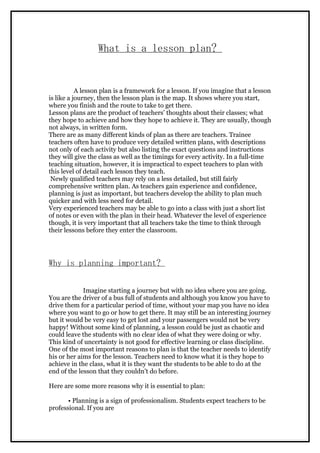
What is a lesson plan
- 1. What is a lesson plan? A lesson plan is a framework for a lesson. If you imagine that a lesson is like a journey, then the lesson plan is the map. It shows where you start, where you finish and the route to take to get there. Lesson plans are the product of teachers’ thoughts about their classes; what they hope to achieve and how they hope to achieve it. They are usually, though not always, in written form. There are as many different kinds of plan as there are teachers. Trainee teachers often have to produce very detailed written plans, with descriptions not only of each activity but also listing the exact questions and instructions they will give the class as well as the timings for every activity. In a full-time teaching situation, however, it is impractical to expect teachers to plan with this level of detail each lesson they teach. Newly qualified teachers may rely on a less detailed, but still fairly comprehensive written plan. As teachers gain experience and confidence, planning is just as important, but teachers develop the ability to plan much quicker and with less need for detail. Very experienced teachers may be able to go into a class with just a short list of notes or even with the plan in their head. Whatever the level of experience though, it is very important that all teachers take the time to think through their lessons before they enter the classroom. Why is planning important? Imagine starting a journey but with no idea where you are going. You are the driver of a bus full of students and although you know you have to drive them for a particular period of time, without your map you have no idea where you want to go or how to get there. It may still be an interesting journey but it would be very easy to get lost and your passengers would not be very happy! Without some kind of planning, a lesson could be just as chaotic and could leave the students with no clear idea of what they were doing or why. This kind of uncertainty is not good for effective learning or class discipline. One of the most important reasons to plan is that the teacher needs to identify his or her aims for the lesson. Teachers need to know what it is they hope to achieve in the class, what it is they want the students to be able to do at the end of the lesson that they couldn’t do before. Here are some more reasons why it is essential to plan: • Planning is a sign of professionalism. Students expect teachers to be professional. If you are
- 2. prepared, the students can tell. They also know if you are not prepared. Planning is a way to help gain the respect of your students. • By planning you are considering your teaching situation and your particular students. However good your teaching material or course book may be, it is unlikely that it was prepared for your particular students. Planning gives you the opportunity to tailor your material and teaching to your class. • As we have seen, lessons need to have certain elements and features such as ESA. Planning encourages teachers to consider these points and ensure they are included in the lesson. • Planning gives the teacher a chance to predict possible problems in the class and think about ways to deal with them. By thoroughly researching the target language and being prepared for difficult questions, for example, the teacher can feel confident in the classroom. If you imagine the lesson is like a journey, then the lesson plan is like a map Without some kind of planning, a lesson could be just as chaotic and could leave the students with no clear idea of what they were doing or why. This kind of uncertainty is not good for effective learning or class discipline. One of the most important reasons to plan is that the teacher needs to identify his or her aims for the lesson. Teachers need to know what it is they hope to achieve in the class, what it is they want the students to be able to do at the end of the lesson that they couldn’t do before.
